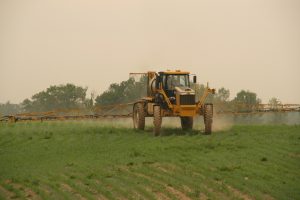18
May
Soft Drink Company Faces Pressure Over Use of Pesticides in its Supply Chain
(Beyond Pesticides, May 18, 2017) A pesticide reduction plan proposed by investors in the Dr. Pepper Snapple Group (DPS) lacks a positive vision that could accomplish the investors’ goals. The shareholder proposal at DPS, which makes Mott’s, 7UP, Snapple, and Canada Dry, was filed by the Green Century Equity Fund, a company that offers environmentally and socially responsible mutual funds, seeks to pressure DPS to reduce toxic pesticide use in its supply chain. According to their press release, the shareholder proposal suggests that DPS “use quantitative metrics to track the amount of pesticides avoided, publish goals to reduce pesticide use or toxicity, and/or provide incentives to growers to minimize the use of pesticides.” However, the shareholder group could better achieve its goals by asking that DPS use certified organic ingredients.

Beyond Pesticides has long sought a broad-scale marketplace transition that does not simply reduce or minimize pesticide use, but prohibits the application of toxic synthetic pesticides by law and promotes the widespread transition of conventional farmland to organic production, which is protective of health and the environment. Certified organic production, with its requirement of a detailed organic system plan and methods to foster and improve soil health, achieves the elimination of toxic pesticides and reduction of overall pesticide use.
In discussing the company’s long-term interests, Marissa LaFave, Shareholder Advocate at Green Century, stated that, “We believe that properly managing, reducing, and disclosing pesticide use could help Dr. Pepper Snapple mitigate the risk of supply chain disruption due to the loss of pollinators, along with reputational, competitive, and regulatory risks.” There is a strong economic argument for the group’s statement, given evidence that it costs more to not protect pollinator species than to allow them to suffer population declines. A 2016 UN report estimates that pollinators worldwide contribute between $235 and $577 billion in agricultural productivity annually and warns of shortages in global food supplies following further pollinator losses.
In its opposition statement on page 79, the DPS board of directors recommends shareholders vote against the proposal and states that, “We will continue to work with our agricultural suppliers, as we have always done, to ensure that they are making meaningful and impactful decisions with respect to their operations and IPM programs, and their effect on the environment.”
This focus on marketplace pressure comes on the heels of a lawsuit filed by Beyond Pesticides against Mott’s, under the District of Columbia’s consumer protection law, for false and misleading “natural” labeling of applesauce products containing residues of the neonicotinoid insecticide acetamiprid. This pesticide is particularly toxic to pollinators, and there are concerns in the scientific literature that are recognized by the European Food Safety Authority about the effect of acetamiprid on human health, particularly children. The plaintiffs maintain that by using “natural” or “all natural ingredients” labeling, Mott’s leads consumers to believe that its applesauce products do not contain synthetic substances.
This suit, as with several similar consumer protection claims, aims to challenge fraud and deception in the marketplace, as well as to protect the integrity of the U.S. Department of Agriculture (USDA) organic label. Unlike the organic label, which adheres to a strict set of rules regulated by the federal government, the term “natural” has not been defined and regulated by the Food and Drug Administration (FDA), or any other government agency. The only way to truly know if what you’re buying is free of harmful pesticides like acetamiprid or other toxic synthetic materials is to buy organic products.
In light of federal inertia and with a growing understanding about the false promises that industrial agricultural systems have provided, citizens, private companies, and policy-makers around the world must push for food systems that place biologically regenerative, organic agriculture at the center. Organic law requires farmers adopt an organic systems plan to support soil biology, ecological balance, and pest prevention. Beyond Pesticides encourages the public to use their market power to support companies that have made a commitment to sourcing only organic products, as well as to encourage new companies to make the transition away from toxic chemical use throughout their supply chains.
Beyond Pesticides also provides many opportunities to get involved in protecting and advancing the integrity of the organic label, and encourages public action to ensure organic’s strong standards remain intact. To find out more about the work Beyond Pesticides is doing on organic integrity, check out Keeping Organic Strong, or to see other reasons to go organic, visit Eating with a Conscience.
Source: Green Century
All unattributed positions and opinions in this piece are those of Beyond Pesticides.










